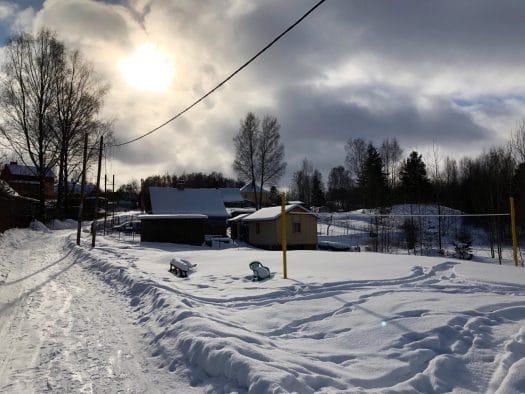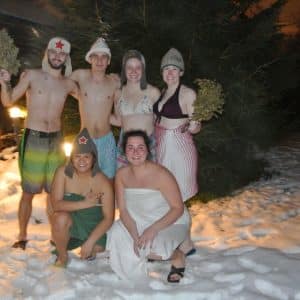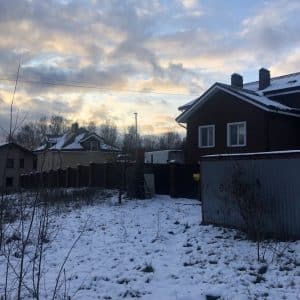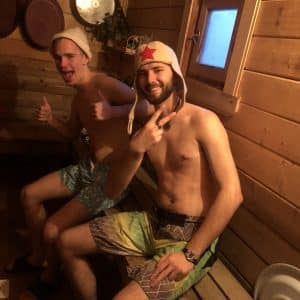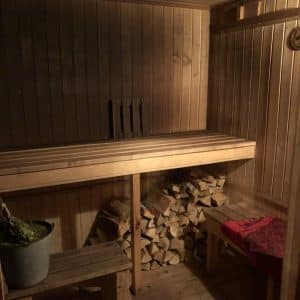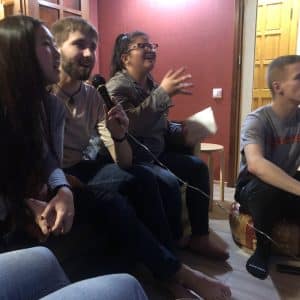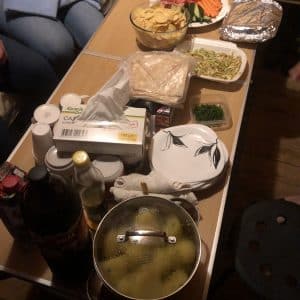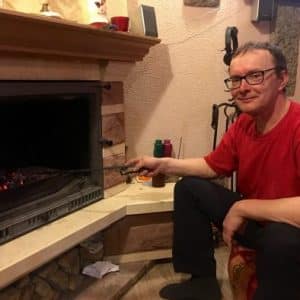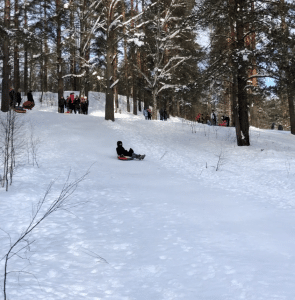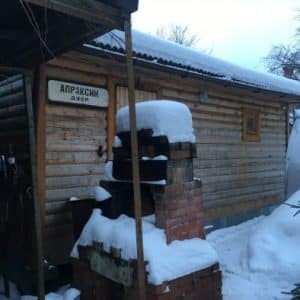Dacha – a summer house with rich cultural and economic history – is an integral part of Russian life. To help students get familiar with its peculiarities, regular visits are organised by SRAS to dachas outside of Moscow, St. Petersburg and Irkutsk. Here, we asked our students from all of those locations to share their impressions with us.
Katya Grigerman (2019)
One sunny Saturday afternoon, a group of us from SRAS traveled just outside of Saint Petersburg to go to our local guide Sergey’s dacha.
A dacha is a house that many Russian people keep outside the main cities that they live in (where they might own an apartment as well). Dachas are often quite simple and passed down from generation to generation. They allow an escape from hectic city lives for the beautiful countryside. Russians use dachas to relax, garden, and especially, to use their banyas!
When we arrived to Sergey’s dacha, it was still light outside, and so we went on a walk around the small neighborhood. He told us that his neighbors are divided between people who come occasionally, and ones who live there full time. It had been snowing a little, and there was a beautiful layer of white snow on the ground. The dachas ranged from very basic and bare “huts” to large, almost mansion-like homes.
When we came back to Sergey’s dacha, we went straight to the banya. The world banya stems from Greek origins, meaning “cleansing of a body with the help of steam.” Some linguists believe that the word is actually taken from the Latin word balneum, which means “something that makes pain and sadness go away.” I think in true Russian tradition, both meanings apply.
This banya was very typical, with a room for sitting and resting, the middle room for rinsing and acclimating to the heat a little, and finally, the hot room. We came into the sitting room, and started to eat a little. Sergey and his wife had prepared meat, potatoes, veggies, and lavash (a thin, Central Asian bread). Being used to going to banya at home (my father built one when I was young), I knew if I ate too much before the banya, I would feel sick, so I decided to go straight into the hot room. And oh boy, was it hot!
The process of using a banya goes something like this: you sit in the hot room for a few minutes, come out, splash some water on your face (or if you are brave, go jump in the snow or a cold river or pond), and then sit in the sitting room for a few minutes. Then, repeat as many times as you want. Somewhere in these reps, you get “beat” with a веник (venik). A venik is a bundle of birch tree leaves and branches that are soaked in hot water and often essential oils, and then used to clean and exfoliate the skin by slapping them against the skin. Sergey was a master at this, and coming out of the banya, you felt like a new born baby.
After the banya, we went back into the house for tea and cakes. Sergey played the accordion, and we all sang along to Kalinka, a traditional Russian song. After this, Sergey surprised us with karaoke! While I’m not the biggest fan of karaoke, I sang along to the songs, and even did a solo of Rasputin by Boney M.
This by far was the most relaxing day I’d spent abroad as part of my program in St. Petersburg and one of my favorites as well!
Charlie Bacsik (2018)
For my spring semester abroad, I’m studying right in the heart of St. Petersburg, Russia. I’m surrounded by a ton of cute cafes and diverse restaurants, and I’m within walking distance of several popular attractions in the city, such as the Hermitage and the Church of the Savior on Spilled Blood. However, being in the city center also means that, at times, it can feel a bit too “touristy” and disconnected from traditional Russian culture. Luckily for my fellow SRAS classmates and me, we were able to get outside of the city limits and explore a more conventional side of Russian living.
The Cultural Coordinator for SRAS in St. Petersburg, Sergey, was kind enough to invite all of us out to his home in the small village of Bor. The town sits northeast of St. Petersburg and the commute, which included both a metro and a bus ride, took roughly an hour. Once we stepped off the bus, it was clear that we were in for a memorable day. The neighborhood was quaint, quiet, and surrounded by piles and piles of pristine, fluffy snow. As a Texan who had rarely ever seen snow, I was instantly mesmerized.
Sergey escorted us to his house, where his wife, Irina, was waiting for us. After exchanging brief pleasantries and passing along our gifts of wine and sweets to Irina, we all bundled up and headed outside for our winter activities! We took a small hike out into the surrounding forest, and Sergey, who enjoys skiing and snow trekking, allowed us to use his equipment (skis, ski boots, snow tubes, extra warm socks, and coats). I quickly found out that I do not have a natural talent for skiing, but I did have loads of fun on the snow tube!
Afterwards, we all got to enjoy our very first Russian banya experience! Sergey and Irina own a small banya house right on their property, and Sergey regularly hosts friends and family who want to enjoy some traditional relaxation. The banya was heated by burning firewood (some now have electric heat sources) and you could also add scented oils to the embers to make the heat room more tranquil. The guys in our group used a birch scent, which is typically considered more manly, while us girls used eucalyptus and juniper. In most public banyas, people typically do not wear any clothing, but swimsuits were okay for this session. Sergey also taught us the correct way to beat your back with birch branches. This is an old tradition that might sound daunting, but it doesn’t hurt and it actually serves as a massage and circulation-booster. Typical banya experiences include a jump into cold water after sitting in the heat, but Sergey had a better idea. Once all of us were sweating and ready to cool off, he had us run outside and roll around in the snow, then run right back inside. Needless to say, it was an unforgettable experience!
Sergey treated us to snacks and cold beverages (kvas and mors) while we were in the banya, as well as a delicious dinner of turkey steaks, potatoes, and borscht. After our banya session, we all took quick showers, and then settled in for some tea and sweets. Our eventful day ended with some poorly sang Russian karaoke and nice conversation around a small fire. Sergey and Irina were so gracious in welcoming us into their home and truly gave us all a taste of authentic Russian culture. I couldn’t be more grateful for such an amazing experience.
Sergey and Irina- My fellow SRAS classmates and I thank you sincerely for your warm generosity and hospitality.

